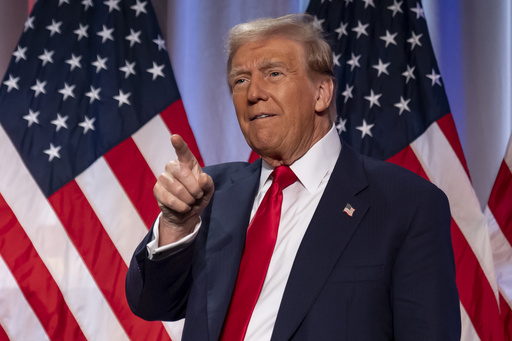
“`html
WASHINGTON — The selection of a treasury secretary by incoming President Donald Trump represents more than just choosing who will be associated with America’s currency.
This decision is pivotal as it will signal his administration’s approach towards import tariffs, a key aspect of his campaign rhetoric.
The frontrunners for the treasury secretary position hold contrasting views regarding the implementation of tariffs, which played a significant role in Trump’s campaign platform.
While Trump himself has shared mixed messages, billionaire investor Scott Bessent has advocated for using tariffs as a negotiation tactic, suggesting they would be a “one-time price adjustment.”
Meanwhile, Cantor Fitzgerald’s CEO Howard Lutnick, who is heavily involved in Trump’s transition team, has positioned himself as a supporter of broader tariffs.
As Trump gears up to define his economic strategy, another critical aspect is determining how pivotal tariffs will be in his administration.
Throughout the election cycle, Trump has portrayed import taxes as both a means to negotiate favorable trade deals and as a revenue source for tax cuts.
His proposals have included universal tariffs reaching as high as 20% and even a striking 60% tax rate on imports from China. However, specifics about the execution and objectives of these tariffs remain largely undefined.
The dual focus on promoting long-term government revenue through tariffs and their use as negotiating tools presents a challenge, as maintaining tariffs for an extended period could stifle economic growth—a promise Trump made during his campaign.
This ambiguity around tariff policies affects not just Trump’s cabinet choices but also raises concerns regarding potential inflation and disruptions in stock market stability that have become emblematic of the Trump agenda since the election.
Bessent has previously noted that tariffs can serve essential roles in foreign policy, supporting causes like increased defense spending by allies and curbing illegal activities.
In contrast, Lutnick has labeled tariffs as vital for safeguarding American workers.
Elon Musk recently voiced his preference for Lutnick over Bessent, suggesting that the latter represents a conventional approach that fails to drive necessary changes in American economic policy.
However, the implications of increased tariffs are significant. While Trump has promised that these measures would generate more factory jobs and strengthen the economy, the potential backlash includes sparking trade wars, irritating stakeholders, and inciting volatility in the stock market.
Moreover, everyday consumers could face higher prices on common goods, which contradicts Trump’s message to voters who are already feeling the pinch.
Recent analysis by economists indicates that a hefty tariff regime could impose an annual cost of $2,600 on the average American household.
As corporate America closely tracks Trump’s transition, many companies are preparing for an uncertain tariff landscape, fostering contingency plans amidst the evolving political climate.
The transition team has emphasized that details regarding the treasury secretary’s immediate policies will come as personnel decisions unfold.
Top executives at major firms acknowledge the unpredictability of tariff policies, with some preparing for elevated tariffs while others remain unsure of the geographic scope.
Executives like Donald Allan, Jr. have indicated that while contingencies are in place, manufacturing shifts back to the U.S. are unlikely due to high costs.
Meanwhile, Timothy Boyle expressed alarm regarding the tariff implications, despite minimal exposure to Chinese imports, calling into question the promises made about boosting domestic production.
In light of Trump’s previous administration, the furnishings and home goods company Williams Sonoma noted a significant reduction in their imports from China, but further expansion of tariffs could pose additional challenges.
Nevertheless, some companies like Constellation Brands, which thrived under Trump’s policies, remain optimistic, suggesting a focused approach on China rather than broader targets like Mexico.
In summary, as Trump approaches his second administration, the choice of treasury secretary will have profound implications for his stance on tariffs, affecting not just trade relationships, but also domestic economic conditions.
“`
